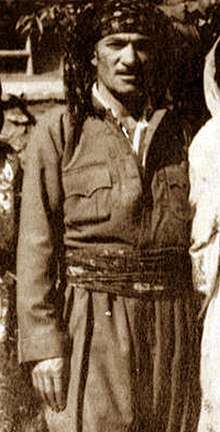Hassan Zirak
Hassan Zirek or Hesen Zîrek (29 November 1921 – 26 June 1972) was a celebrated West Kurdish songwriter-singer from Bukan, known for his recordings of classical Kurdish folk songs. He was famous for his classical and sensual lyrics, and it is believed that he composed over thousand songs in his lifetime.[1]
Hassan Zirak | |
|---|---|
.png) | |
| Background information | |
| Birth name | Hassan Zirak |
| Born | November 29, 1921 Bukan, West Azerbaijan, [Kurdistan] |
| Died | June 26, 1972 (aged 50) Bukan, West Azerbaijan, West Kurdistan |
| Genres | Classical, folk, Kurdish |
| Occupation(s) | Musician |
| Instruments | Vocal |
| Years active | 1956–1972 |
| Website | http://hassanzirak.ir/ |
Early life and career
He was born in Harmelah (Hermêle), a small village near the city of Bukan, northwestern Iran. Zirek was born to Abdulla Zirek and Amina, the title of his name was Erlume from his father which means, "clever" in Kurdish and some contribute it to his fathers talents and abilities that he showed during his work in the Xan of the Agha of Hermêle. Hassan had also a brother and sister, Hussein and Mina. He was only 5 years old when his father died. His mother remarried shortly after his father's death leaving Hassan emotionally broken down. At the age of 12 he began to work for the Agha of Hermêle, at which his voice was a major source for the entertainment of the people in the villages. After one year he left the village he was born in, and headed to the main Kurdish-inhabited cities and worked in Kurdish restaurants. He showed his singing talents in his early age. In 1953, at the age of 27, he left Harmelah and recorded a great number of songs in Kurdish for the Kurdish section of the Baghdad broadcasting station. Most of his songs were remade version of Kurdish folklore songs and he was very talented in it. After the Iraqi Revolution of 1958, Zirek was expelled from Iraq. He moved to Tehran where he was employed by Tehran Radio Station. This is where he met his wife Medya Zendi. After spending few years in his native Iran and recording some of his unbeatable hits, Zirek was again forced to leave in 1960. Instead of Baghdad, this time he made his way to northern Iraq (i.e. present-day Iraqi Kurdistan), where he worked with the Kurdish Fine Art Groups. As an artist who is known to have his home packed on his back, Zirek was forced to leave northern Iraq in 1967. Departing there, this time he went to Saqqez in Iran where he lived up to his death. In 1971 Zirek was hospitalised and was diagnosed with stage four cancer. He spent countless nights at the hospital in Urmia and Bukan. Hassan Zirak died at the age of fifty. His body is buried around his native city Bukan, on Nalashkenah (Kurdish: Nalishkêne) mountain one of the most famous mountains of the region which lies close to the city. Although Hesen Zirek was an illiterate musician and had an unbearable and short life, he composed around 1500 songs, most of which were composed, worded and sang simultaneously (free style folk singer). Zirak is considered as one of the most popular and well known singers among the Kurdish people in all of Northern and Eastern Kurdistan.

Hassan Zirak has songs with other famous singers like Mamle, Mala Hussain Abdulzada, Osman Bukani, and Ahmed Shamal. The song " Malî Babim Be Wefa " is one of the songs that Hassan Zirak recorded along with Mamle and Mala Hussain Abdulzada in 1960 with the help of " Kirmansha Musical Group ". Besides his native Sorani Kurdish, he also sang in other languages such as Azeri, Turkish, and Persian.
Discography
Songs by Hassan Zirak:
- Disan shew hat
- Wek qumri
- Lorkê
- Ketane
- Heynar
- Kabûkê
- Leyla
- Khan Baji (Azeri and Kurdi)
- Zara (Zahra)
- Dogme daxe
- Kermashan shari shirinm
- Aman doktor
- Be dr dawaw darman
- Boch mnet nawê
- Ho leyli
- Naleshkêna
- Male babm Nesrin
- Detrsm bmrm
- Kewyar
- Esmer
- Shofêr
References
- Broughton, Ellingham, Trillo, Simon, Mark, Richard (1999). World music: the rough guide. Africa, Europe and the Middle East, Volum 1.CS1 maint: multiple names: authors list (link)